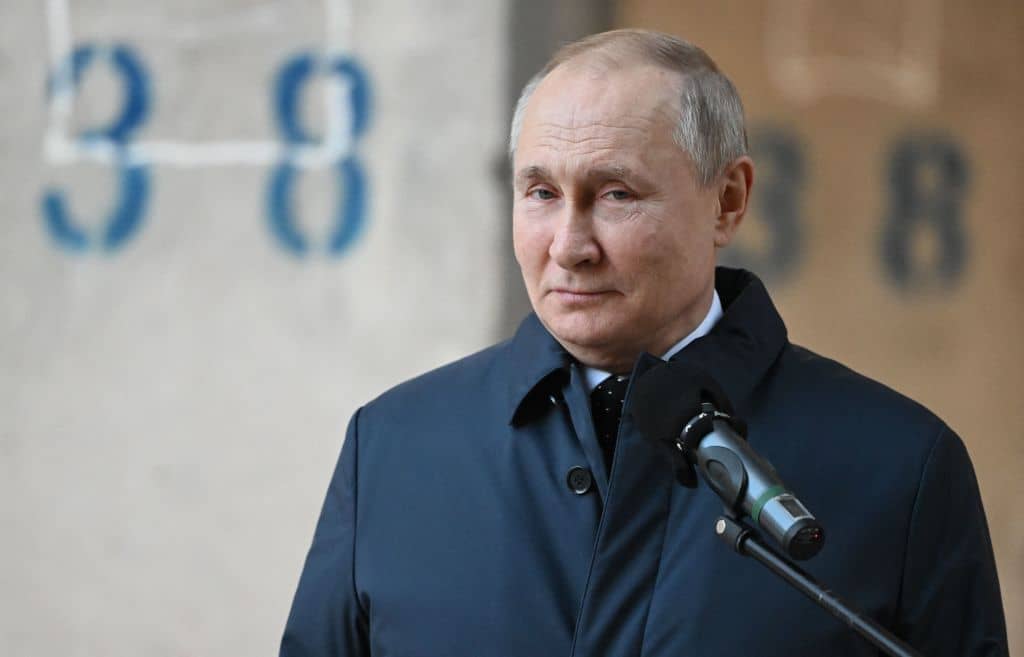The war against Ukraine – or the ‘special military operation’ as it is compulsorily known in Moscow – has lasted over a fortnight.
For weeks Putin maintained a bristling encampment of forces in western Russia, southern Belarus and Crimea. He hoped this would provoke the collapse of the ‘neo-Nazi’ Ukrainian government and its comedian-president. When this failed to occur, he invaded.
Photographs show Putin sitting at the end of a long table keeping his distance from his leading associates, such as the booming-voiced foreign minister Sergei Lavrov and khaki-clad defence minister Sergei Shoigu. Gone are the days of Kremlin camaraderie: Putin now expects and gets the maximum display of deference from his followers. The war is his so-called ‘operation’ and his alone. He is performing the most dangerous high-wire act in geopolitics of this century– and he may yet fall to earth.
Putin is performing the most dangerous high-wire act in geopolitics of this century– and he may yet fall to earth
But though he shocked some in his coterie with his order to make war on Ukraine, most of them share his anti-western mindset – and many Russians go along with it too. Putin rose to the Russian presidency in 2000 when the country’s entire political establishment was sick of America’s dominance in global politics. Nato’s aerial bombing of Belgrade in 1999 reinforced their resentment. The expansion of Nato membership to the countries of Eastern Europe, starting with Poland, Hungary and the Czech Republic at the end of the last century, aggravated this feeling even though Putin for a while explored the possibility of Russia joining the alliance.
Putin warned as long ago as 2008 against the American proposal to put Ukraine on a track to Nato membership. The Ukrainian lands are special in the Russian historical memory. Russian Christians trace the origins of their national Church to Kievan Rus. Millions of Russians have relatives in Ukraine. But Russia’s official attitude to Ukraine is schizophrenic. When Hitler invaded the USSR in 1941, he found it easy to recruit some Ukrainians to his side – and Putin plays on this when daubing the entire Ukrainian government as fascist.
The idea is widespread in Russian ruling circles that Ukraine is an artificial state. Ukrainian speakers are seen as lost little brothers and sisters which Russians merely want to help back into the bosom of the family. When Ukraine asserted its independence in 1918, it was undoubtedly a puppet state of imperial Germany. Under subsequent Soviet rule, it became an internal republic, and its frontiers were often adjusted at the whim of authorities in Moscow – this was how Crimea was transferred to Ukraine in 1954.
Those same authorities always feared Ukraine’s potential to undermine them. In 1932 Stalin inflicted a famine on Ukrainians to ease the imposition of agricultural collectivisation. Restrictions on Ukrainian schooling and cultural self-expression prevailed in the ensuing decades. Ukraine, with its rich farming soil and deposits of coal and iron, was a treasured asset and its referendum in favour of independence in December 1991 delivered the final shock that caused the USSR’s disintegration.
Throughout the 1990s Russia’s economy suffered a great depression while ditching communism for capitalism – and Ukraine suffered even more. But as Ukrainians moved out of this economic trauma, they asserted demands for democratic government which Putin was doing his damnedest to suppress in Russia. Ukraine had an ‘orange revolution’ in 2004-5 that brought the reformer Viktor Yushchenko to the presidency. His pro-Moscow opponent Viktor Yanukovych won the election in 2010 but his decision to tilt away from the European Union in 2013 led to his overthrow after protracted street demonstrations in Kyiv.
Since then Ukraine has been ruled by presidents and governments committed to the pursuit of eventual membership of the European Union and Nato. Conflict with Putin’s Russia has been constant. Crimea was invaded in February 2014 and subsequently Russian forces, typically disguised as local volunteers, occupied the parts of Donbas directly on the Russian frontier. Negotiations between Moscow and Kyiv were ineffectual. It was bad enough for authoritarian Russia to have a democratic Estonia, Latvia and Lithuania on its doorstep but immeasurably worse to allow democracy to become rooted in Ukraine.
Both Volodymyr Zelensky and his presidential predecessor Petro Poroshenko found that concessions to Russia only increased the Muscovite appetite for bigger ones. They introduced policies which increased the spread of the Ukrainian language. This enraged the Putin administration. Putin himself had undergone what might be called ‘doctrine-creep’. Whereas in the early 2000s he had sought a rapprochement with the West, he increasingly saw Russia as the victim of centuries of conspiracies by western powers. In his eyes, he was the leader who would make Russia stand tall again.
The West’s leadership behaved ingloriously in 2021. Trump remained the Putin Excuse Corporation. Merkel continued to endorse the Nord Stream II gas pipeline. Johnson protected London’s laundromat of Russian dirty money. Biden talked of restoring Nato unity and then trashed it during the Afghanistan withdrawal. Nato offered eventual membership to Zelensky without preparing for Moscow’s untoward reaction. Putin had never felt taller.
Surely, he thought, Ukrainian resistance would crumble at the first sight of a Russian tank. His doctrine and analysis have already disappointed him, and he cannot blame it all on faulty intelligence reports: he only had to think more clearly for himself about Ukraine’s history and spirit. He may well obtain one of his long tables in future international talks – who would want to sit near him? But he will not achieve the peace he had in mind before unleashing the hounds of war.






Comments